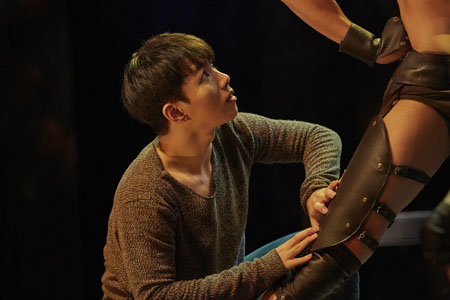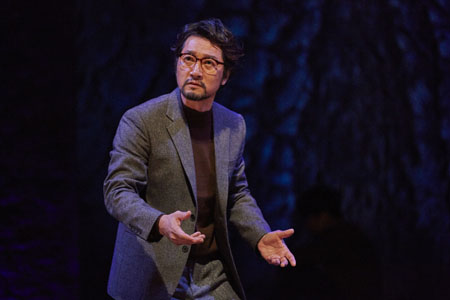What is the most passionate thing in your life? It could be the study you did when you were a senior in high school, or the first love you felt that was pure and romantic. The play <Equus>, by Peter Shaffer, presents a boy who puts all his passion into a “horse”. The title of the play, <Equus>, means “horse” in Latin. Equus, for this boy, is freedom and love, and at the same time it is the object of admiration. How come the horse can be everything to the boy? Let’s see the boy’s story in the play <Equus>.
Synopsis
In the middle of the night, a boy stabs seven horses in the eye with a stick of iron in a stable. The boy's name is Alan Strang. Instead of sending him to jail, the judge in charge of Alan's case sends him to a psychiatrist, Martin Dysart, who visits Alan's house to start treatment. Little by little, Dysart hears Alan's story and then discovers primitive and innocent passion hidden behind the boy’s cruel crime.
Characters
Alan Strang: He is a 17-year-old boy. He has lived under the strain of his parent’s values because of their distorted love. With no one to talk to, Alan communicates only with Equus and wants to be saved. However, the Equus becomes rather a surveillant, and Alan [not Equus, right?] feels tremendous fear.

Martin Dysart: He is a psychiatrist in charge of Alan. He is skeptical about his job, and at first, he is reluctant to treat Alan's lunatic-like appearance. Gradually, however, Dysart becomes understanding by listening to Alan's story, and he looks back on his life.

The Horse that Filled a Hole in His Heart
Alan has always lived with a hole in his heart. His mother is portrayed as a loving mother in the early part of the play. She is a devout Christian and reads books to Alan before he goes to bed. The truth is, however, she was only reading the Bible over and over and injecting her faith into Alan. Regardless of Alan's belief, she forced her own thoughts on him. On the other hand, Alan's father, a printer, does not believe in God. "How can you say that you are the son of a printer and do not read a book!" his father shouted to Alan, always dominating reading. He doesn't even try to talk to his son. Under his mother, who only implants her values, and his patriarchal father, Alan had no family or friends to tell his own story. He does not even have a chance to express his inner self. That is why the free running horse was the object of admiration to Alan, and the only thing he can communicate with. The first time Alan faced a horse was at the beach when he was age six. Seeing a jagged, rushing horse, he felt a sense of freedom he had never felt. From that experience, Alan started to be interested in horses, which would fill a hole in Alan’s heart.
Equus: Alan’s alter ego
Alan admires the figure of the running horse, and his admiration soon leads him to worship the horse. He comes to think that Equus is a super-ego who knows everything about him. Furthermore, the Equus, which existed only in Alan’s imagination, actually comes up to him as he starts to work in the stable. For Alan, the Equus is no longer imaginary. Alan grooms and cleans the horses in the stable and he feels drawn to one of them, named Nugget (or Equus). The "Equus" and the six horses in the play are all anthropomorphized. It is enough to conjure up a real horse, including breath sounds, gestures and even looks. The audience focuses on the sound of the seven horses breathing in and out together with bated breath. In the scene where Alan and Equus are interacting, they seem to have even stronger erotic feelings for each other. With these feelings, Alan rides Equus at midnight secretly, naked. When they run together and roll their feet, the vibrations of the stage spread to the audience. It is the moment when the audience feels the pure and primitive passion of Alan.
A Doctor Can Destroy Passion, but He Cannot Create It.
The judge, who is in charge of Alan's case, and maybe many people would agree, says that the treatment could end Alan's pain. We think Alan may be simply looking for sincere understanding from his parents, and the treatment can give him what he wants. Maybe this play looks like a happy ending as the treatment is worked out from that point of view. However, Dysart thinks differently. Creating passion is that only “I” can do it, but the treatment could destroy that passion. Talking with Alan, Dysart feels confused. Alan's pure and primitive love for the Equus was not something Dysart would destroy through treatment as he has lived out of passion. Rather, Alan’s passion for creating the existence of Equus is the object of envy. So, until the last moment Alan has told the whole story, Dysart is agonizing. Along with him, we can also think over what is right throughout the play. Is it right to regard someone's passion as abnormal in the name of treatment? Is it really right to treat Alan in order to integrate him back into “normal” society? Through these questions, the audience could have an opportunity to think about the value of passion.
Peter Shaffer's masterpiece, <Equus>, has been performed more than 2,000 times in Korea for 40 years since its premiere in 1975. The reason why <Equus> has continued to be loved may be because it gives people of all ages something to think about. When was your most passionate moment? Would it be okay if the doctor destroyed your passion under the name of treatment? For every Dysart who is thinking over the question, and for everyone who lives without passion, CAH recommends <Equus>.
Dates: 2019.09.07~2019.11.17
Hours: Weekdays 8 P.M./ Weekends 2 P.M., 6 P.M. (No performance on Monday)
Place: Seokyeong University Performing Arts Center
Ticket Prices: Seat R 60,000 won/Seat S 40,000 won
Contact: 02-3672-0900
Kwak Da-eun
dashineshere@cau,ac.kr

